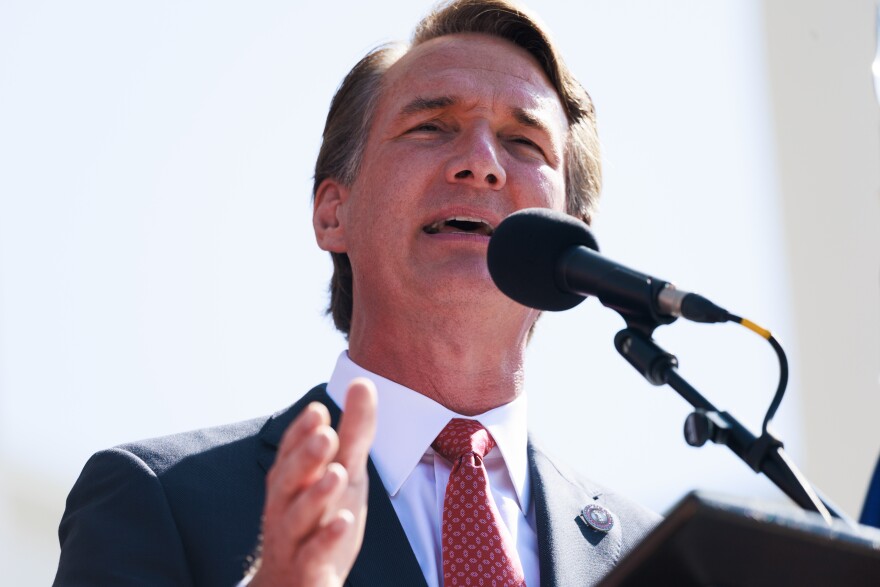Work on compromise budget legislation Virginia lawmakers will take up is complete, and the bill does not include language enabling a proposed relocation by the NBA’s Washington Wizards and NHL’s Washington Capitals to Alexandria, top lawmakers said Thursday.
The development does not necessarily mean the end of the road for Republican Gov. Glenn Youngkin’s plan to lure the teams across the Potomac River with a $2 billion development district featuring a new arena. But it deals yet another blow for the proposal, a top priority for Youngkin.
In a news conference at the foot of the Capitol steps, the governor said he believed the Democratic-led General Assembly was poised to make “a colossal mistake.” He sought to make the case that they should reconsider and restore the project terms to the budget before advancing it to his desk.
“They have a chance to stand up and do what's right. They have a chance to assess this one-of-a-kind, first-of-its-kind economic development opportunity on the merits of the opportunity. And I will again repeat again that the merits are truly, truly amazing,” he said.
Democratic Sen. L. Louise Lucas, of Portsmouth, the top Senate negotiator and a sharp critic of Youngkin, stood on the Capitol portico, looking down on the governor and sometimes smiling as he spoke. She told reporters earlier that she remained firmly opposed to the deal, in large part because of its reliance on bonds backed by the state and city governments.
Senate Majority Leader Scott Surovell said he objected to trying to include the arena project in the budget because the process does not provide a full opportunity for debate. Surovell also blasted Youngkin for what he called the governor's unwillingness to consider some of Democrats' top priorities.
“This is a process that requires compromise, and so far the governor has made very little indication that he’s willing to compromise,” Surovell said.
Lucas and Democratic Del. Luke Torian, who chairs the House Appropriations Committee and led negotiations for his chamber, said the arena-related provisions had been removed from the legislation, which lawmakers are expected to take up Saturday.
The legislation had been in the hands of a conference committee — a small, bipartisan group of legislators that's been meeting behind closed doors — after the two chambers passed competing budget bills earlier this session and then rejected both.

Torian, who sponsored a standalone version of legislation to underpin the deal that was defeated earlier, said he was “perhaps a little disappointed” the language didn't make it into the budget.
“But that's the nature of trying to govern here in the commonwealth,” he said.
The budget was the last remaining vehicle for legislation to pave the way for the deal because Torian's bill and another standalone version failed earlier this session. Lucas refused to give them a hearing in her committee.
Once lawmakers send the governor a budget, he could pursue an amendment and restore the project language — or he could call a special session on the issue. Legislators could also reject the budget bill and send it back to the conference committee for further consideration.
Youngkin and entrepreneur Ted Leonsis, an entrepreneur and the ultrawealthy CEO of the teams' parent company — Monumental Sports and Entertainment — announced in December that they had reached an understanding on a deal to relocate the Capitals and Wizards.
The company had no immediate comment on Thursday's development.
At least one D.C. official welcomed the snafu in Virginia and expressed hope that the teams would remain in the district.
“The Arena and Monumental Sports have been partners with the District for almost 30 years, and a great asset to downtown,” D.C. Council Chairperson Phil Mendelson said in a statement. “As a deal in Virginia remains uncertain, the Council continues to be ready to welcome Monumental Sports’ change of mind."
The plan calls for the creation of a $2-billion development, partly financed by public money, in the Potomac Yard section of Alexandria that would include an arena, practice facility and corporate headquarters for Monumental. There would also be a separate performing arts venue, all just miles from Capital One Arena, where the teams currently play in Washington.
Under the proposed terms of the deal, Monumental and the city of Alexandria would contribute some upfront funds, but about $1.5 billion would be financed through bonds issued by a governmental entity that lawmakers were expected to set up this year.
The bonds were envisioned to be repaid through a mix of revenue from the project, including a ticket tax, parking fees, concession taxes, income taxes levied on athletes performing at the arena and naming rights from the district.
Proponents said those sources will more than cover the debt, creating new revenue for the city and state in the project’s first year. But about one-third of the financing, under the terms lawmakers were expected to vote on, would be backed by the “moral obligation” of the city and state governments, meaning taxpayers could be on the hook, if the project revenues don’t come through as expected.
Youngkin, a private equity executive before he ran for public office, emphasized that the state would not be putting in upfront cash and that revenue that “otherwise will not be here” would help finance the deal.
He warned that the way the Senate has handled the deal could put the state's business-friendly reputation at risk.
Lucas dismissed that concern and said she had serious issues with the idea of “putting taxpayers' money behind the project of a billionaire.”
She acknowledged that her move to block the arena could damage some of Democrats' top legislative priorities, like a measure establishing marijuana retail sales. But she said she thought the trade-off was worth it.
“I just stood firm on what I believe in my heart to be in the best interest of the commonwealth. And that was just to say no to the 'Glenn dome,'” she said using a nickname she's given the proposed arena.


